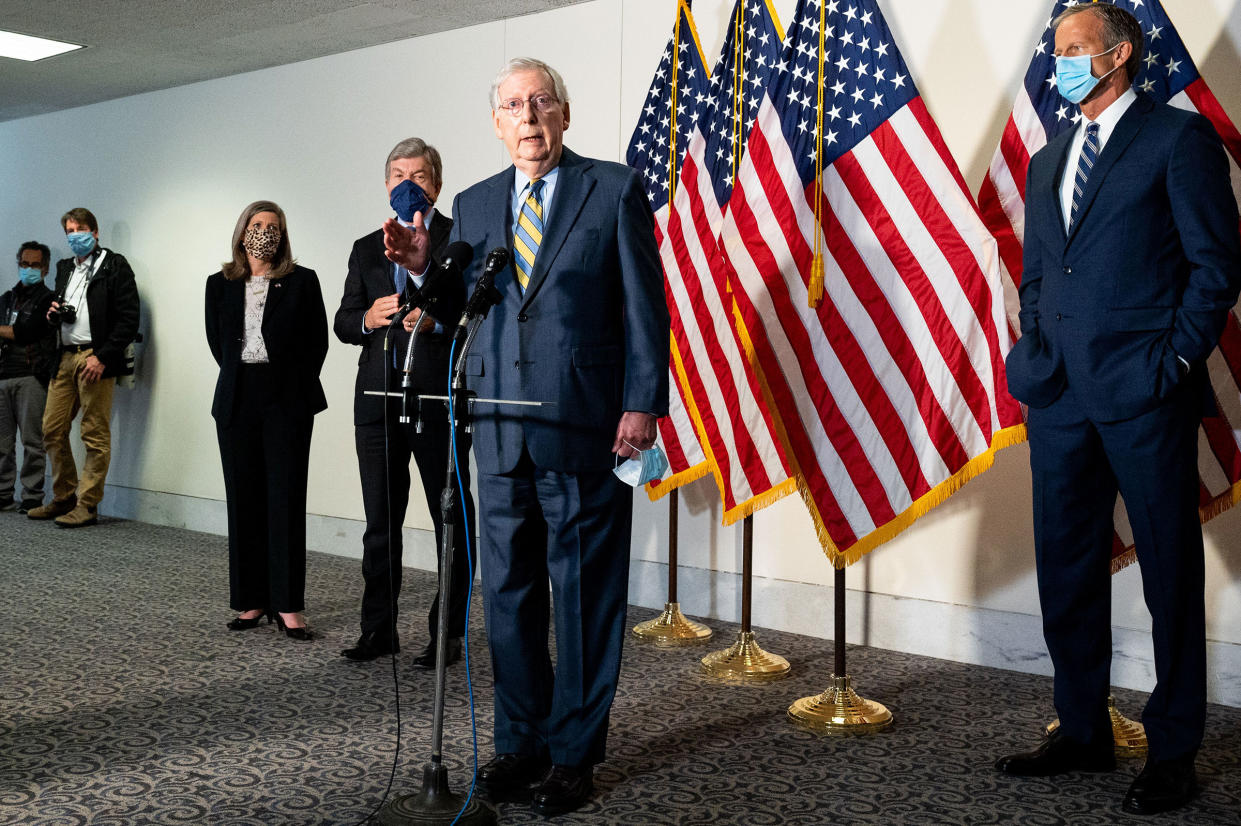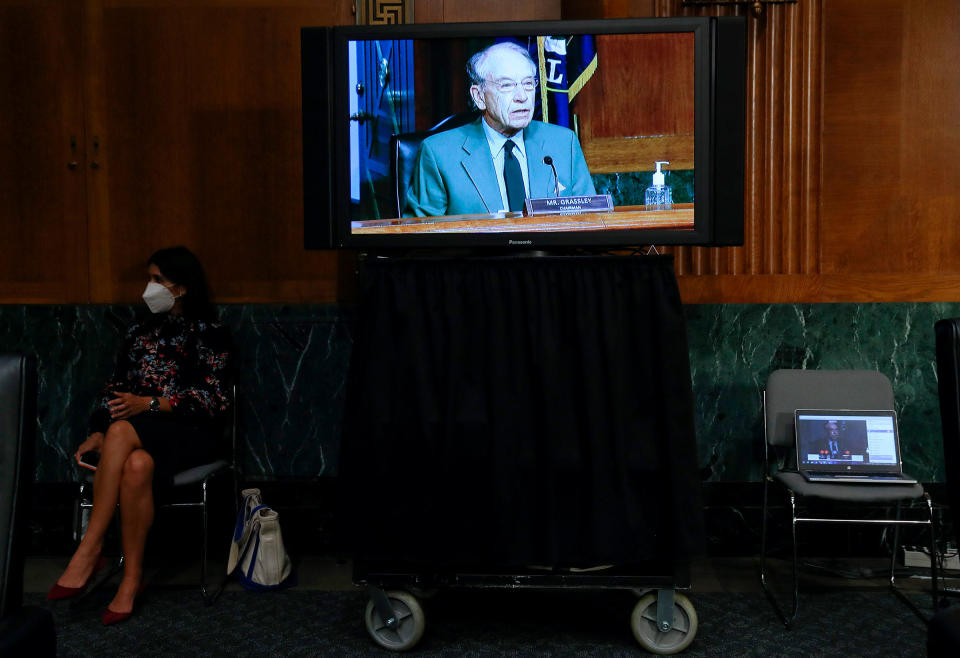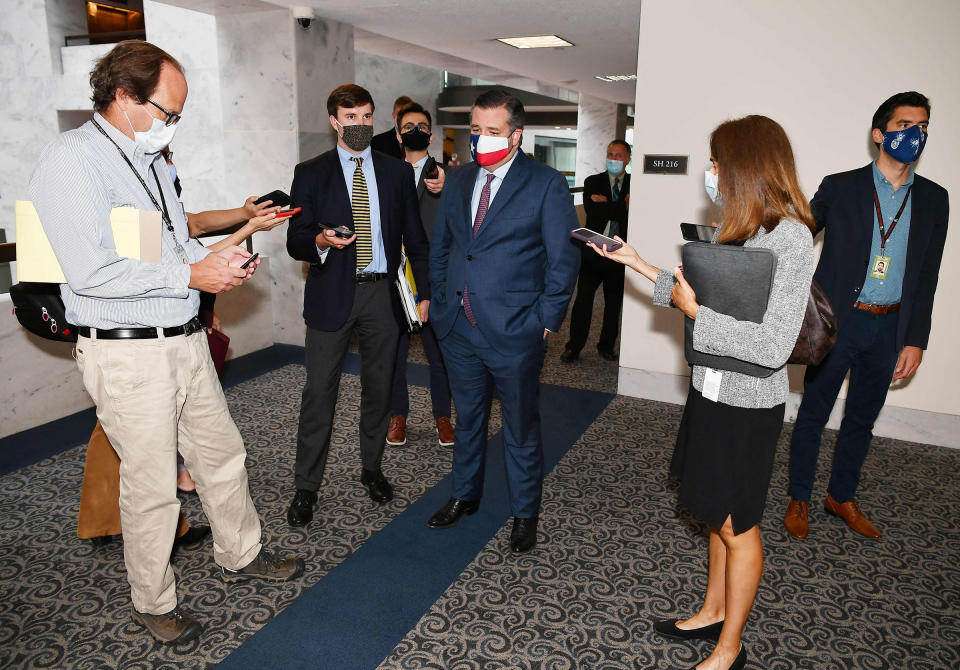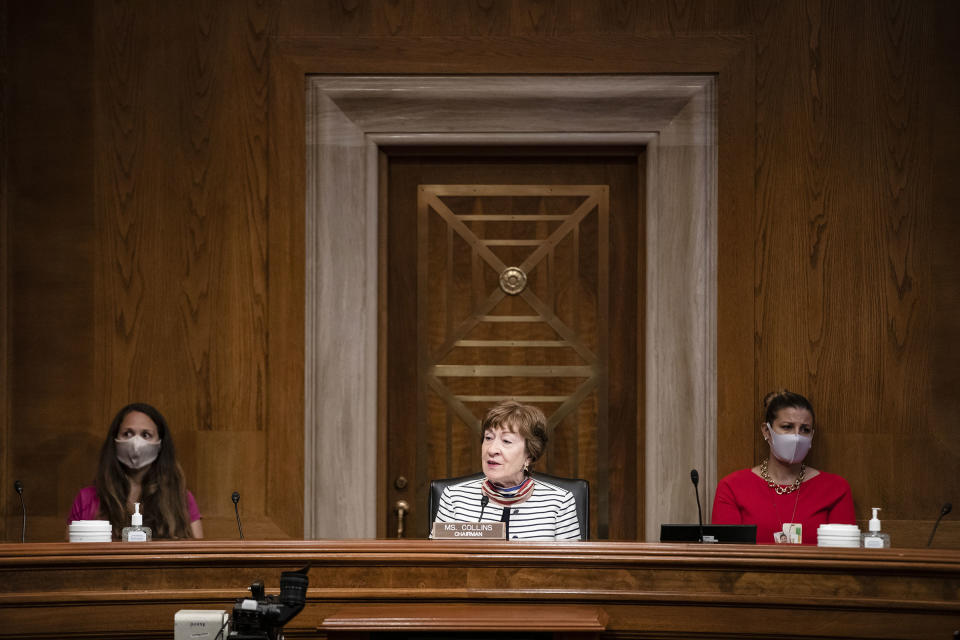Here's What GOP Senators Said About the 2016 Supreme Court Vacancy—And What They're Saying Now

Senator Mitch McConnell speaks at a press conference of the Senate Republican Caucus leadership on Sept. 22, 2020. Credit - Michael Brochstein—SOPA Images/Shutterstock
Republicans in the Senate appear to have lined up enough support to move ahead with a vote to fill the Supreme Court seat vacated by the death of Justice Ruth Bader Ginsburg on Sept. 18, mere weeks before the presidential election. Just two Republican senators, Susan Collins of Maine and Lisa Murkowski from Alaska, have opposed Senate Majority Leader Mitch McConnell’s plan to forge ahead with a quick confirmation vote for President Donald Trump’s nominee, whom he plans to name Saturday.
For the GOP, it’s a sharp departure from the precedent they set in 2016. Conservative Justice Antonin Scalia died in February of that year, nearly nine months before that year’s election. With President Barack Obama set to nominate a replacement who would pull the court to the left, Senate Republicans said that the seat should not be filled in an election year, and refused to hold hearings to consider Obama’s eventual nominee, Judge Merrick Garland. McConnell argued that not since 1888 had the Senate confirmed a Supreme Court nominee by an opposing party’s President to fill a vacancy that arose in an election year.
Senate Democrats were outraged, arguing that Republicans were stonewalling for political purposes. Democrats’ position has now changed, too, with members of the Senate minority assailing the GOP for hypocrisy and vehemently opposing Trump and McConnell’s plan to hold a vote on Trump’s nominee in the coming weeks.
Here’s what some Republican senators—from party leaders to members of the Judiciary Committee considering the nominee to members up for re-election this fall—said in 2016, and what they’re saying now:
Senate Majority Leader Mitch McConnell: The Senate Majority Leader, who is up for re-election in Kentucky, has extraordinary power to decide what does or does not happen on the Senate floor.
Then: “The American people should have a voice in the selection of their next Supreme Court Justice. Therefore, this vacancy should not be filled until we have a new President,” McConnell said in a statement on February 13, 2016, the day Scalia died.
Now: “In the last midterm election before Justice Scalia’s death in 2016, Americans elected a Republican Senate majority because we pledged to check and balance the last days of a lame-duck president’s second term. We kept our promise. Since the 1880s, no Senate has confirmed an opposite-party president’s Supreme Court nominee in a presidential election year. By contrast, Americans reelected our majority in 2016 and expanded it in 2018 because we pledged to work with President Trump and support his agenda, particularly his outstanding appointments to the federal judiciary. Once again, we will keep our promise. President Trump’s nominee will receive a vote on the floor of the United States Senate,” McConnell said in a statement the same day Ginsburg died. (In 1988, a presidential election year, a Democratic Senate confirmed Justice Anthony Kennedy, Republican President Ronald Reagan’s nominee, to fill a 1987 vacancy.)
South Carolina Senator Lindsey Graham: The chairman of the Judiciary Committee will oversee committee hearings examining the nominee’s credentials. Graham is up for re-election this fall.
Then: “I want you to use my words against me. If there’s a Republican president in 2016 and a vacancy occurs in the last year of the first term, you can say Lindsey Graham said, let’s let the next president, whoever it might be, make that nomination, and you could use my words against me and you’d be absolutely right. We’re setting a precedent here today, Republicans are, that in the last year, at least of a lame-duck eight-year term, I would say it’s going to be a four-year term, that you’re not going to fill a vacancy on the Supreme Court based on what we’re doing here today. That’s going to be the new rule,” Graham said at a Judiciary Committee meeting in March 2016.
Now: “I therefore think it is important that we proceed expeditiously to process any nomination made by President Trump to fill this vacancy. I am certain if the shoe were on the other foot, you would do the same,” Graham said in a Sept. 21 statement.
Make sense of what matters in Washington. Sign up for the daily D.C. Brief newsletter.

Iowa Senator Chuck Grassley: A senior member of the Judiciary Committee, Grasley was chair in 2016 when Republicans decided to block the Obama Supreme Court nominee.
Then: “The fact of the matter is that it’s been standard practice over the last nearly 80 years that Supreme Court nominees are not nominated and confirmed during a presidential election year. Given the huge divide in the country, and the fact that this President, above all others, has made no bones about his goal to use the courts to circumvent Congress and push through his own agenda, it only makes sense that we defer to the American people who will elect a new president to select the next Supreme Court Justice,” Grassley said in a Feb. 13, 2016 statement.
Now: “I’ve consistently said that taking up and evaluating a nominee in 2020 would be a decision for the current chairman of the Judiciary Committee and the Senate Majority Leader. Both have confirmed their intentions to move forward, so that’s what will happen.” Grassley said in a Sept. 21 statement.
Texas Senator John Cornyn: Cornyn, a member of the Judiciary Committee, was the Senate Majority whip when the Scalia vacancy came up. He is up for re-election this year.
Then: “At this critical juncture in our nation’s history, Texans and the American people deserve to have a say in the selection of the next lifetime appointment to the Supreme Court. The only way to empower the American people and ensure they have a voice is for the next President to make the nomination to fill this vacancy,” Cornyn said in a March 16, 2016 statement.
Now: “Our friends on the other side of the aisle have tried to compare this to the vacancy in 2016, but the facts were different. At that point, we had a President of one party in his final year in office, and the Senate Majority of another party,” Cornyn said in a statement on Sept. 21.
Utah Senator Mike Lee: Lee is a member of the Senate Judiciary Committee.
Then: “The Senate is a political body. And it’s put into the appointment process for a reason … it shouldn’t be surprising to us that the Senate has chosen to exercise its power and let the next president fill this vacancy,” Lee said at a debate in October of 2016, according to the Washington Post.
Now: “In 2016, President Obama nominated a replacement for Justice Scalia and my Senate colleagues and I gave our advice and consent on the nominee, consistent with the Constitution, by rejecting him. This year, President Trump will nominate a replacement for Justice Ginsburg and, consistent with the Constitution, we will again give our advice and consent. If we like the nominee, we will confirm her. If we don’t, we won’t. It’s that simple,” Lee said in a Sept. 21 statement.

Texas Senator Ted Cruz: Cruz, who was included in Trump’s recent short list of potential Supreme Court nominees, is a member of the Senate Judiciary Committee.
Then: “There should be no hearing on any nomination that President Obama makes, and if any confirmation vote is attempted, I will filibuster it…We will not consider any Supreme Court nominee until the people have spoken and a new president is inaugurated,” Cruz wrote in a Wall Street Journal op-ed on March 6, 2016.
Now: “The President should next week nominate a successor to the Court. I think it is critical that the Senate takes up and confirms that successor before Election Day. There’s going to be enormous pressure from the media, there’s going to be enormous pressure from Democrats to delay filling this vacancy, but this election, this nomination, is why Donald Trump was elected, this confirmation is why the voters voted for a Republican majority in the Senate,” Cruz told Fox News on Sept. 18.
Nebraska Senator Ben Sasse: Sasse is on the Judiciary Committee.
Then: “Mr. President, I’m here to provide you some advice on how you might get my consent [on a nominee]. I recommend that you take your potential nominee and go and stand in the Rose Garden and have that nominee explicitly repudiate your ‘I have a pen and I have a phone’ theories of executive unilateralism,” said in a video posted on February 18, 2016.
Now: “Yeah, you know where this is going,” Sasse told reporters when asked what he thought about a nominee being moved now.
Iowa Senator Joni Ernst: Ernst, who is locked in a re-election race, is a member of the Senate Judiciary Committee.
Then: “In the midst of a critical election, the American people deserve to have a say in this important decision that will impact the course of our country for years to come. This is not about any particular nominee; rather this is about giving the American people a voice… We must wait to see what the people say this November, and then our next president will put forward a nominee,” Ernst said in a March 16, 2016 statement.
Now: “Once the president puts forward his nominee for the Supreme Court, I will carry out my duty—as a member of the Senate Judiciary Committee—to evaluate the nominee for our nation’s highest court,” she said in a September 21, 2020 statement.
Colorado Senator Cory Gardner: Gardner, who served as chair of the National Republican Senatorial Committee for the 2018 election cycle, is in the midst of a tough re-election fight.
Then: “Our next election is too soon and the stakes are too high; the American people deserve a role in this process as the next Supreme Court Justice will influence the direction of this country for years to come,” Gardner said in a March 16, 2016 statement.
Now: “When a President exercises constitutional authority to nominate a judge for the Supreme Court vacancy, the Senate must decide how to best fulfill its constitutional duty of advice and consent. I have and will continue to support judicial nominees who will protect our Constitution, not legislate from the bench, and uphold the law. Should a qualified nominee who meets this criteria be put forward, I will vote to confirm,” Gardner said in a Sept. 21 statement.
North Carolina Senator Thom Tillis: Tillis, a member of the Judiciary Committee, is locked in a close re-election campaign.
Then: “It is essential to the institution of the Senate and to the very health of our Republic to not launch our nation into a partisan, divisive confirmation battle during the very same time the American people are casting their ballots to elect our next President. Vice President Biden was absolutely correct: there should be no hearings, there should be no confirmation. The most pragmatic conclusion to draw is to hold the Supreme Court vacancy until the American people’s voices have been heard,” Tillis said in a February 26, 2016 statement.
Now: “Four years ago, a Supreme Court vacancy arose under divided government and a lame-duck president as Americans were choosing his successor. Today, however, President Trump is again facing voters at the ballot box and North Carolinians will ultimately render their judgment on his presidency and how he chooses to fill the vacancy,” Tillis said in a Sept. 19 statement.

Maine Senator Susan Collins: Collins is one of two Republican Senators who have said they believe that the Senate should wait to vote on a Supreme Court nominee until after the election. She publicly backed holding hearings for Garland in 2016. Collins is in a tough re-election fight this fall.
Then: “Chief Judge Garland and I discussed a wide variety of issues, ranging from executive overreach and the separation of powers, to Second Amendment cases, to his judicial philosophy. Judge Garland gave thorough, impressive responses to all of my questions, and I found him to be well informed, thoughtful, and extraordinarily bright. Throughout my time in the Senate, I have always found that whether its legislation, nominations, or treaties, we are best served by following the regular order. That is why I have called for the Senate to proceed to the next step by holding public hearings,” Collins said in a statement after meeting with Garland on April 5, 2016.
Now: “In order for the American people to have faith in their elected officials, we must act fairly and consistently—no matter which political party is in power. President Trump has the constitutional authority to make a nomination to fill the Supreme Court vacancy, and I would have no objection to the Senate Judiciary Committee’s beginning the process of reviewing his nominee’s credentials. Given the proximity of the presidential election, however, I do not believe that the Senate should vote on the nominee prior to the election. In fairness to the American people, who will either be re-electing the President or selecting a new one, the decision on a lifetime appointment to the Supreme Court should be made by the President who is elected on November 3rd,” Collins said in a statement on Sept. 19.
Georgia Senator David Perdue: Perdue, who was a member of the Judiciary Committee at the time of the Scalia vacancy, is up for re-election.
Then: “The Constitution is clear: the President shall nominate judges to the Supreme Court, but the power to grant, or withhold, consent of such nominees rests exclusively with the United States Senate. What’s at stake here is the balance of our nation’s highest court and the direction of our country for decades. I remain firm in my decision to exercise my Constitutional authority and withhold consent on any nominee to the Supreme Court submitted by President Obama,” Perdue said in a statement on March 16, 2016.
Now: “Once the President announces a nomination, the United States Senate should begin the process that moves this to a full Senate vote,” Perdue said in a Sept. 20 statement.

